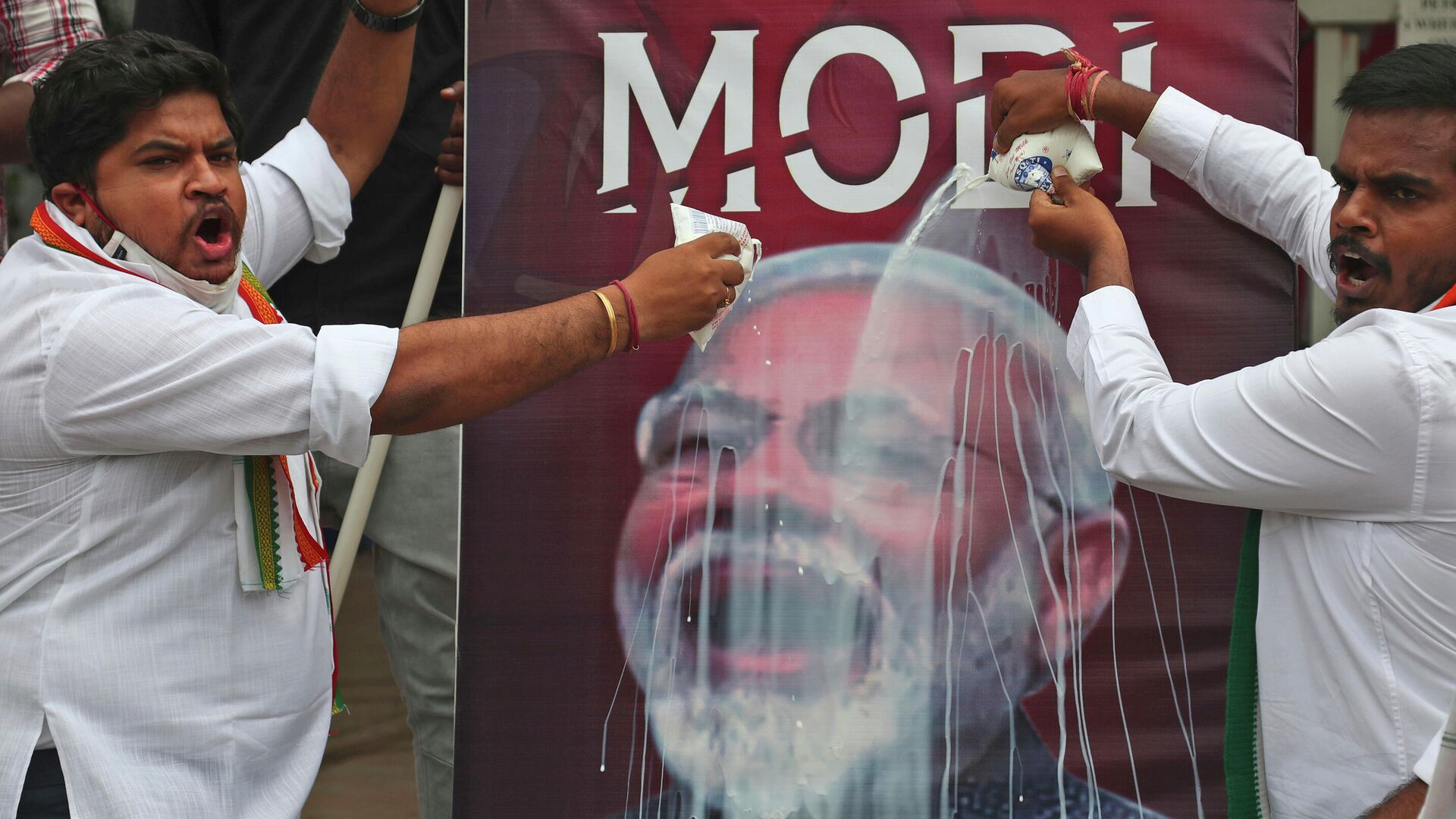https://sputnikglobe.com/20220620/presidential-election-in-india-will-test-unity-of-opposition-parties-political-pundits-say-1096399089.html
Presidential Election in India Will Test Unity of Opposition Parties, Political Pundits Say
Presidential Election in India Will Test Unity of Opposition Parties, Political Pundits Say
Sputnik International
India's 16th presidential elections are scheduled to take place on 18 July, and the result will be announced three days later. The president is elected for... 20.06.2022, Sputnik International
2022-06-20T05:24+0000
2022-06-20T05:24+0000
2024-03-28T12:40+0000
president
presidential election
presidential candidate
presidential race
politics
domestic politics
bharatiya janata party (bjp)
indian national congress
mamata banerjee
ram nath kovind
https://cdn1.img.sputnikglobe.com/img/07e5/0a/12/1090008796_0:412:2862:2023_1920x0_80_0_0_805f795fdc07dc85433599459aa37144.jpg
Even though India is gearing up for its presidential elections in mid-July, neither the federally ruling Bharatiya Janata Party (BJP), nor the opposition has revealed who they will be putting forward as their candidate. Both sides at present are deliberating on which candidate could draw the maximum support from all parties.Mamata Banerjee, head of the Trinamool Congress (TMC) party, called a meeting of the opposition parties in New Delhi on 15 June to discuss and choose a suitable candidate. Banerjee favoured Nationalist Congress Party chief Sharad Pawar who is highly respected in political circles but the 81-year-old declined the invitation to stand.Banerjee, who is state chief of West Bengal, invited 22 political parties but representatives of only 16 turned up for the meeting in Delhi.Sputnik has spoken to political experts to discuss the significance of the presidential polls and the preparedness of the political parties.Significance of Presidential Polls for BJP and Opposition“I think the presidential poll doesn't hold much significance for the BJP ahead of the 2024 elections because it has separate strategies. However, it is much more significant for the opposition because it will test their unity once again,” psephologist Vinod Kumar Shukla told Sputnik.He said the major challenge for the opposition parties would be to keep its flock together. "It will be very difficult to announce a candidate unanimously when there are so many opposition parties."In the 2017 presidential polls, the BJP put Ram Nath Kovind forward as the candidate and garnered support from many opposition parties, because Kovind represented the Dalit (oppressed) community.Senior journalist Prem Kumar echoed Shukla's views as he also believes that the opposition doesn't seem to be united."Every party wants to place a candidate who is more inclined to their political ideology. So there might be a clash of interest among the opposition parties as there are at least a dozen of politicians who have an aspiration to lead the opposition," Kumar said.He also said that another challenge for the opposition would be to do better than it did last time.“If the opposition is able to get around 40 to 45 percent of votes in this presidential poll, it will be an achievement and will prove that it can unite to take on the BJP in other polls too,” Kumar said.At the time of the 2017 presidential poll, the BJP was in charge of most states in the country but its control this time has dwindled.Nonetheless, the BJP still has an edge over the opposition as it is in a majority in the Lower House (Lok Sabha) of the Parliament and has more parliamentarians in the Upper House (Rajya Sabha).Probable Candidates for OppositionThough Nationalist Congress Party chief Pawar has refused to stand, saying he “still has an active political innings to play”, the opposition parties also considered former West Bengal governor Gopalkrishna Gandhi, the grandson of Mahatma Gandhi, and former State Chief of Jammu and Kashmir, Farooq Abdullah.However, nothing was decided.On the subject of Pawar's refusal to stand in the election, Shukla said it shouldn’t be seen as a final decision - he believes Pawar might eventually succumb to pressure and join the race.According to Shukla, there are other options the opposition parties might consider: Nitish Kumar, Bihar state chief running the government with the BJP's support, former prime minister Haradanahalli Doddegowda Deve Gowda, and Meira Kumar, the 2017 contender.Prem Kumar said it is important to see who is doing the proposing because some opposition parties are not comfortable with the candidate, which may be fielded by the country's main opposition party, Congress. Kumar believes that Gopalkrishna Gandhi could be a good choice as all parties might agree on his candidacy, since he has good relations with most of the political parties.How Prepared is BJP for Presidential Poll?As for the BJP's preparedness for the poll, Shukla believes that the governing party has adopted a strategy of wait and see.“As far as I can understand, the BJP must have chosen its candidate and will unveil him or her at the right time,” he said.But Kumar believes the BJP's strategy is entirely different.“The BJP has adopted a completely changed political style. It starts preparing for elections, be it local elections, state assembly elections or parliamentary elections, very early. This is the reason that despite being in power in fewer states than it was in previous presidential elections, it is in a comfortable situation to win it this time too,” Kumar added.How is India's President Elected?In India, the president is elected by an electoral college consisting of members of both Houses of Parliament and lawmakers of the states and Union Territories of Delhi and Puducherry. The nominated members of the Upper House, Lower House and the State Assemblies as well as members of state Legislative Councils are not part of it.A total of 4,809 electors, comprising 776 members of Parliament (MPs) and 4,033 members of the Legislative Assembly (MLAs) will vote to elect Ram Nath Kovind's successor.Kovind’s tenure will end on 24 July. A new president will be sworn in on 25 July.
Sputnik International
feedback@sputniknews.com
+74956456601
MIA „Rosiya Segodnya“
2022
Rahul Trivedi
https://cdn1.img.sputnikglobe.com/img/07e5/05/12/1082926121_0:-1:627:627_100x100_80_0_0_d882e1a63f627c25b7a534fb8b8234d7.jpg
Rahul Trivedi
https://cdn1.img.sputnikglobe.com/img/07e5/05/12/1082926121_0:-1:627:627_100x100_80_0_0_d882e1a63f627c25b7a534fb8b8234d7.jpg
News
en_EN
Sputnik International
feedback@sputniknews.com
+74956456601
MIA „Rosiya Segodnya“
Sputnik International
feedback@sputniknews.com
+74956456601
MIA „Rosiya Segodnya“
Rahul Trivedi
https://cdn1.img.sputnikglobe.com/img/07e5/05/12/1082926121_0:-1:627:627_100x100_80_0_0_d882e1a63f627c25b7a534fb8b8234d7.jpg
president, presidential election, presidential candidate, presidential race, politics, domestic politics, bharatiya janata party (bjp), indian national congress, mamata banerjee, ram nath kovind, congress
president, presidential election, presidential candidate, presidential race, politics, domestic politics, bharatiya janata party (bjp), indian national congress, mamata banerjee, ram nath kovind, congress
Presidential Election in India Will Test Unity of Opposition Parties, Political Pundits Say
05:24 GMT 20.06.2022 (Updated: 12:40 GMT 28.03.2024) India's 16th presidential elections are scheduled to take place on 18 July, and the result will be announced three days later. The president is elected for five years. Ram Nath Kovind, who was backed by the Bharatiya Janata Party (BJP), won the 2017 election, defeating Meira Kumar of the Congress party.
Even though India is gearing up for its
presidential elections in mid-July, neither the federally ruling Bharatiya Janata Party (BJP), nor the opposition has revealed who they will be putting forward as their candidate. Both sides at present are deliberating on which candidate could draw the maximum support from all parties.
Mamata Banerjee, head of the Trinamool Congress (TMC) party, called a meeting of the opposition parties in New Delhi on 15 June to discuss and choose a suitable candidate. Banerjee favoured Nationalist Congress Party chief Sharad Pawar who is highly respected in political circles but the 81-year-old declined the invitation to stand.
Banerjee, who is state chief of West Bengal, invited 22 political parties but representatives of only 16 turned up for the meeting in Delhi.
Sputnik has spoken to political experts to discuss the significance of the presidential polls and the preparedness of the political parties.
Significance of Presidential Polls for BJP and Opposition
“I think the presidential poll doesn't hold much significance for the BJP ahead of the 2024 elections because it has separate strategies. However, it is much more significant for the opposition because it will test their unity once again,” psephologist Vinod Kumar Shukla told Sputnik.
He said the major challenge for the opposition parties would be to keep its flock together. "It will be very difficult to announce a candidate unanimously when there are so many opposition parties."
In the 2017 presidential polls, the BJP put Ram Nath Kovind forward as the candidate and garnered support from many opposition parties, because Kovind represented the Dalit (oppressed) community.
Senior journalist Prem Kumar echoed Shukla's views as he also believes that the opposition doesn't seem to be united.
"Every party wants to place a candidate who is more inclined to their political ideology. So there might be a clash of interest among the opposition parties as there are at least a dozen of politicians who have an aspiration to lead the opposition," Kumar said.
He also said that another challenge for the opposition would be to do better than it did last time.
“If the opposition is able to get around 40 to 45 percent of votes in this presidential poll, it will be an achievement and will prove that it can unite to take on the BJP in other polls too,” Kumar said.
At the time of the 2017 presidential poll, the BJP was in charge of most states in the country but its control this time has dwindled.
Nonetheless, the BJP still has an edge over the opposition as it is in a majority in the Lower House (Lok Sabha) of the Parliament and has more parliamentarians in the Upper House (Rajya Sabha).
Probable Candidates for Opposition
Though Nationalist Congress Party chief Pawar has refused to stand, saying he “still has an active political innings to play”, the opposition parties also considered former West Bengal governor Gopalkrishna Gandhi, the grandson of Mahatma Gandhi, and former State Chief of Jammu and Kashmir, Farooq Abdullah.
However, nothing was decided.
On the subject of Pawar's refusal to stand in the election, Shukla said it shouldn’t be seen as a final decision - he believes Pawar might eventually succumb to pressure and join the race.
According to Shukla, there are other options the opposition parties might consider: Nitish Kumar, Bihar state chief running the government with the BJP's support, former prime minister Haradanahalli Doddegowda Deve Gowda, and Meira Kumar, the 2017 contender.
Prem Kumar said it is important to see who is doing the proposing because some opposition parties are not comfortable with the candidate, which may be fielded by the country's main opposition party, Congress.
Kumar believes that Gopalkrishna Gandhi could be a good choice as all parties might agree on his candidacy, since he has good relations with most of the political parties.
“There is also a possibility that the opposition might field a candidate from the
Dalit community,” he added.
How Prepared is BJP for Presidential Poll?
As for the BJP's preparedness for the poll, Shukla believes that the governing party has adopted a strategy of wait and see.
“As far as I can understand, the BJP must have chosen its candidate and will unveil him or her at the right time,” he said.
But Kumar believes the BJP's strategy is entirely different.
“The BJP has adopted a completely changed political style. It starts preparing for elections, be it local elections, state assembly elections or parliamentary elections, very early. This is the reason that despite being in power in fewer states than it was in previous presidential elections, it is in a comfortable situation to win it this time too,” Kumar added.
How is India's President Elected?
In India, the
president is elected by an electoral college consisting of members of both Houses of Parliament and lawmakers of the states and Union Territories of Delhi and Puducherry.
The nominated members of the Upper House, Lower House and the State Assemblies as well as members of state Legislative Councils are not part of it.
A total of 4,809 electors, comprising 776 members of Parliament (MPs) and 4,033 members of the Legislative Assembly (MLAs) will vote to elect Ram Nath Kovind's successor.
Kovind’s tenure will end on 24 July. A new president will be sworn in on 25 July.




